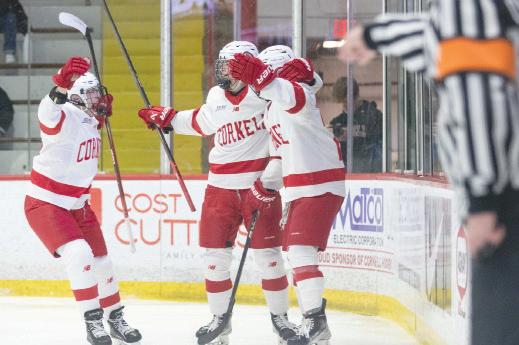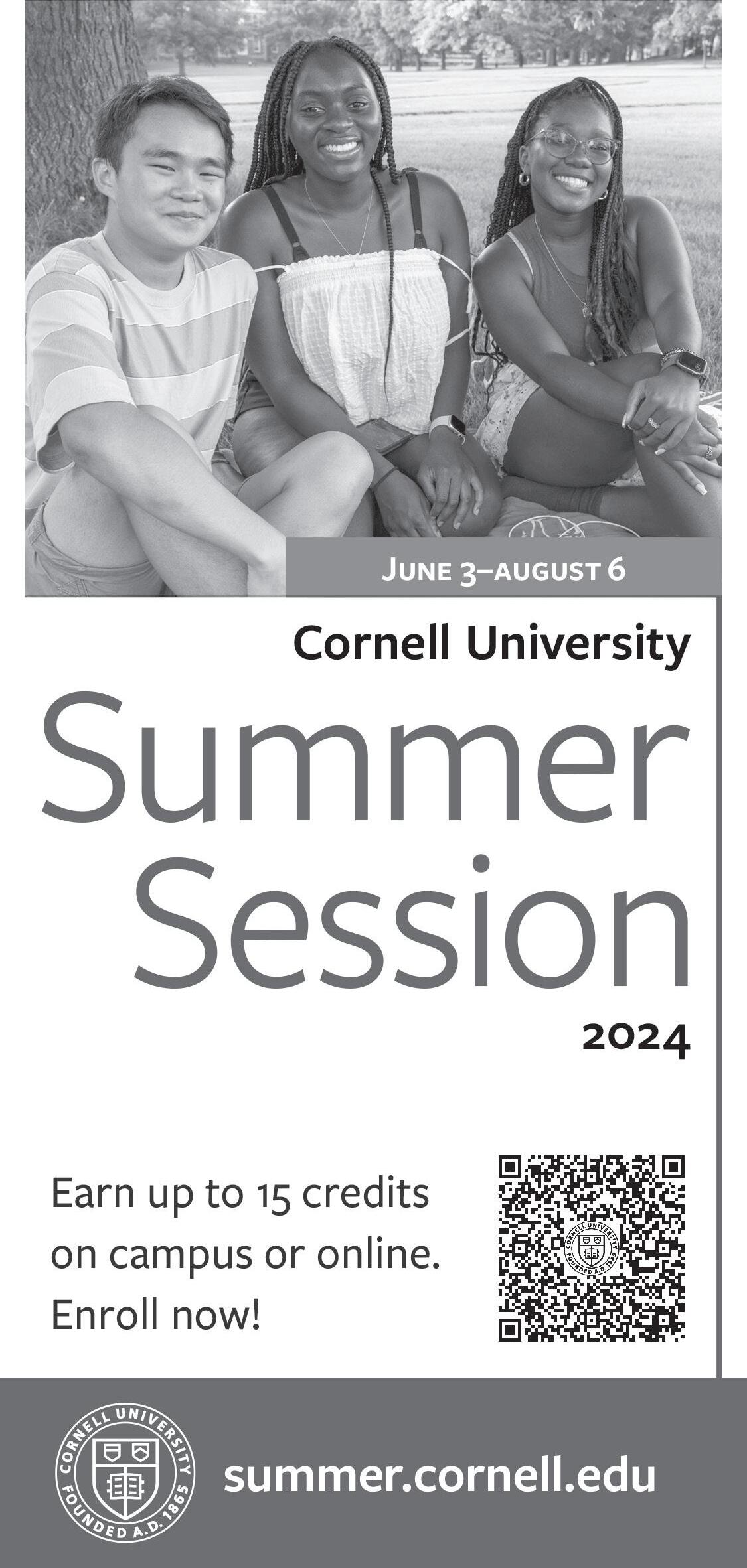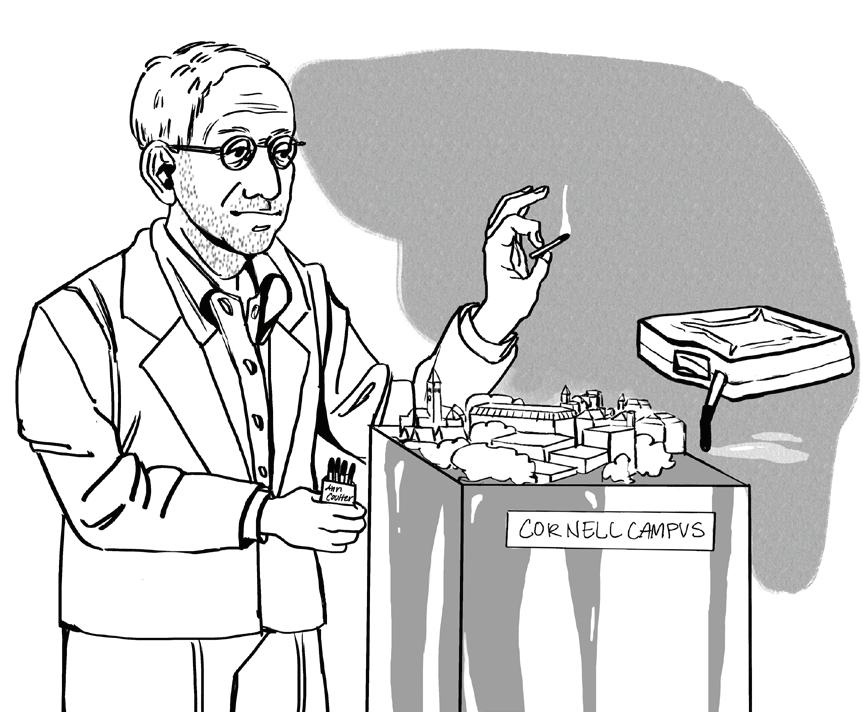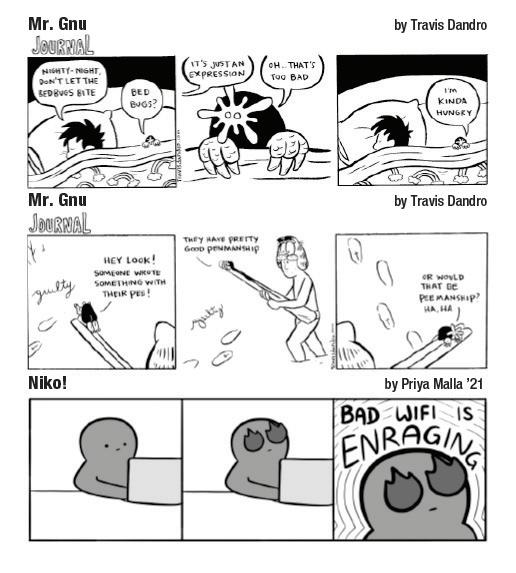The Corne¬ Daily Sun
8



8


The Coalition for Mutual Liberation has issued an ultimatum. The pro-Palestine organization will continue to violate the controversial Interim Expressive Activity Policy unless the Board of Trustees agrees to consider voting on divestment from arms manufacturers providing Israel’s military with weaponry.
CML, an umbrella organization that encompasses over 40 organizations from Cornell and the larger community, hosted a campus-wide protest advertised as a “walk out to fight for divestment.” Held on Thursday, March 14, the demonstration’s timing aligned with Cornell Giving Day, an annual one-day fundraising event that
contributes to the University's To Do the Greatest Good campaign.
Approximately 200 student protestors chanted phrases including “Any person, any study, Cornell Trustees’ hands are bloody” and “From the river to the sea, Palestine will be free.” Protestors argued that Cornell’s actions do not reflect the University’s mission “to do the greatest good.”
A speaker in Duffield stated, “We will continue to violate the Student Code of Conduct. We will continue to violate the interim policy. We will continue to disrupt, we will continue to make noise. … We will continue to do all of these things until [President] Martha [Pollack] agrees to call for a vote on divestment at the Board of Trustees meeting on March 22.”

Ann Coulter ’84, a controversial conservative media personality, is reportedly set to make her return to Cornell’s campus on April 16.
Nadine Strossen, a free speech advocate who formerly served as the president of the American Civil Liberties Union, confirmed Coulter’s agreed-upon date to come back to the Hill in an email to The Sun.
Strossen wrote that Coulter “just told me that [the event] will be on 4/16.”
Strossen originally proposed a Coulter speaking opportunity to Provost Michael Kotlikoff in January. Kotlikoff responded immediately by saying, “‘Oh, that’s a great idea,’” according to Strossen.
Coulter, who helped found the conservative news source The Cornell Review as an undergraduate, has a long history of making discriminatory remarks against minority groups including immigrants, Jews and Muslims.
After The Sun recently broke the news that the University had invited Coulter to campus, Kotlikoff wrote a letter to the editor in The Sun in which he defended his efforts to bring the rightwing pundit back to campus as being in line with Cornell’s

dedication to free expression.
“I agreed that there could be few more powerful demonstrations of Cornell’s commitment to free expression than to have Ms. Coulter return to campus and present her views. … I believe that Cornell must be a place where the presentation of ideas is protected and inviolable,” Kotlikoff wrote.
“I believe that Cornell must be a place where the presentation of ideas is protected and inviolable”
Provost KotlikoffKotlikoff added that he had “worked with the Federalist Society at Cornell, the Cornell Political Union, the Heterodox Academy Campus Community at Cornell and other Cornell organizations to sponsor such a presentation.”
A spokesperson for Cornell Media Relations could not confirm the date of Coulter’s planned appearance or identify which campus groups would sponsor the event.
To continue reading thisw story, please visit www.cornellsun.com.
On Thursday, the Student Assembly was slated to hold a council with three representatives from Cornell administration — Dean Marla Love, Provost Michael Kotlikoff and Vice President and General Counsel Donica Varner.
But Love was the only representative to appear for the meeting, prompting a postponement with no set date.
The administrator’s appearance was intended to converse with S.A. members about the heavily criticized Interim Expressive Activity Policy, according to Executive Vice President Claire Ting ’25 in a written statement to The Sun.
Enacted on Jan. 24, the interim policy added restrictions on expressive activity, including measures against carrying sticks and poles in protests and limited hours for amplified sound.
Both the S.A. and the Faculty Senate have claimed they were not properly consulted by the Cornell administration in the policy’s implementation. On Feb. 22, The S.A. unanimously passed Resolution 58 to call for the interim policy’s suspension until a process for formal consultation with the University assemblies is finalized.
“Two of our three guests are delayed and we’re going to have to reschedule,” Love announced upon her entrance.
Love did not provide any additional context for their absence.
When asked when the meeting would be rescheduled by an S.A. member, Love responded: “We’ll have to look at the calendar.”
Love did not provide any further scheduling specifications.
A representative of Cornell Media Relations did not respond to a request for comment by the time of publication. This postponement was unexpected by S.A. members, who had been awaiting the arrival of the administrative representatives.
To continue reading this article, please visit www.cornellsun.com.




The Ithaca Tenants Union has revived their push for Ithaca to opt into the Emergency Tenant Protection Act, a piece of legislation that stabilizes rent in certain housing units.
The ETPA — which was passed in 1974 — stabilizes rent prices in buildings built before 1974 with six or more units. Although the act originally included only New York City and surrounding counties, other municipalities in New York State, including Kingston, NY and Newburgh, NY have since opted into the ETPA. Since their founding in March 2020, The ITU has been advocating for greater tenants’ protections in Ithaca, through advocating both for Ithaca to opt into the ETPA and for both Ithaca and New York State to adopt Good Cause Legislation — which would prohibit landlords from evicting tenants without lease violations.
“There was a campaign a couple of years ago to get opt into ETPA, and it kind of fizzled because people decided that other things were more important, that we could build new housing, we were going to have new affordable housing and that we didn’t need to do ETPA,” said ITU Co-Chair Katie Sims ’20.
However, as Ithacans face rising rents, Sims said opting into the ETPA would be a crucial step toward permanently affordable housing in Ithaca.
Drawing from the example of New York City, where almost half of all apartments are rent stabilized, which protects tenants against unreasonable rent increases, Sims said that rent stabilization would prove to be essential to maintaining Ithaca’s supply of housing affordable to the working-class.
“If we opted into ETPA, then about 15 percent of units in the city would become permanently rent stabilized, and that would keep them permanently affordable,” Sims said.
Sims also praised ETPA as a means of checking the power of landlords in setting rents.
“We do think it’s politically important that not all price setting is done in the hands of people who are trying to make a profit from rents,” Sims said. “The ETPA achieves this because there is a board that sets the rent increases and it’s made of tenants, property owners and experts in the community. So it’s a more holistic process in setting rent increases.”
Sims was optimistic about potential increased


support for Ithaca’s opting into the ETPA following major changes to the Common Council following November’s elections. Ithaca Mayor Robert Cantelmo grad agreed that political support for opting into ETPA exists on the Common Council.
Cantelmo, who has publicly supported Ithaca’s opting into the ETPA in the past, said that opting in could be one part of a larger strategy to address Ithaca’s housing concerns.
“[Opting into the ETPA] would have some modest impact,” Cantelmo said. “There are of course some limitations in its effectiveness just given the size and the building requirements that would be covered under it, but I think [a] housing solution for our community is an ‘all of the above’ approach. We need to take every lever that we have to try and promote affordability and slow the rate of significant cost-of-living increases.”
Cantelmo argued that the long-term solution to the affordability crisis is pairing stabilization efforts with an increase in the supply of housing.
“The number one thing that’s gonna address the affordability problem is the City reexamining its land use and needing to move to a direction where it revises its zoning code to promote more feasibility for the construction of middle housing,” Cantelmo said.
However, Kayla Lane, a member of the Landlords Association of Tompkins County board of directors, criticized the effect opting into the ETPA would have on the structure of the housing market.
“I believe [that] in a housing market — just like most markets — there [is] natural supply and demand that needs to take place. I know everybody locally feels that the housing market supply needs to improve as far as affordability,” Lane said. “I’m not sure if opting into [the ETPA] will really get to the root of the problem. I can see it creating further problems that will [have] a trickle effect.”
Lane argued that instead of opting into the ETPA, making changes to zoning regulations would better address the lack of affordable housing supply in Ithaca.
To continue reading this article, please visit www.cornellsun.com.
Dancers snapped wooden sapps, twisted kundes and leaped in the air amid a flurry of vibrant, flowing colors during the 21st PAO Bhangra exhibition on March 16.
“I like to say that PAO is called PAO Bhangra because that is the sound of your mind being blown,” said Joshua Samuel ’25, co-president of Cornell Bhangra.
The event, which is the largest bhangra showcase in the nation, brought together five intercollegiate bhangra dance teams and Cornell special guest performances along with students, faculty and families who supported performers from the audience.
“Cornell [Bhangra] is insane,” said Anika Rajagopal ’27, who attended the event. “[The team is] super close, dedicated and diligent.”
Entering its 26th year of celebrating traditional Punjabi folk dance, Cornell Bhangra is the longest-running collegiate team in North America.
The 30-member, gender-inclusive team recently performed at the November 2023 Macy’s Thanksgiving Day Parade, the February 2024 East Coast Showdown and the March 2024 Naach Di Cleveland performance, where they placed third in the bhangra category. In 2014, Cornell Bhangra performed on America’s Got Talent in the show’s quarterfinals.
Five other collegiate Bhangra teams performed in the showcase — Nova Southeastern University Bhangra, Binghamton Bhangra,
New England Bhangra Club, Buffalo Bhangra and MIT Bhangra – each offering unique choreography, creativity and music.
The event opened with a performance from Rochester Jawani, a youth bhangra group. But they were not the only ones dancing — in the audience, young children danced along to the music, inspired by what they saw on stage.
“[It is] so fulfilling to see everyone have a good time, not only [on] our team, but [also with] the other teams coming and the audience members who bought their tickets and want to see this happen,” Samuel said.
The New England Bhangra Club is an all-female Bhangra group. The showcase also featured two other all-female performance troupes from Cornell — Illuminations, a Chinese cultural dance troupe and the Touchtones, an acapella group.
The female representation in bhangra teams on stage excited many audience members.
“Bhangra is a pretty male-dominated field, and women’s teams are traditionally seen as less powerful and less strong, and the [New England Bhangra Club] actually ate and they were so good [and] so energetic, redefining boundaries,” Rajagopal said.
To continue reading this article, please visit www.cornellsun.com.
Grace Liu can be reached at gliu@cornellsun.com.


Protestors distributed a flier urging Pollack to call for the trustees to vote on divesting the University’s endowment from ten weapons manufacturers, including Boeing and Lockheed Martin, and “any companies directly complicit in the genocide in Gaza.”
The flier also emphasized the Board of Trustee’s 2016 Standard Guide to Divestment, which established that “the board will consider divesting its endowment assets from a company only when the company’s actions or inactions are ‘morally reprehensible,’ constituting apartheid, genocide, human trafficking, slavery or systemic cruelty to children, including violation of child labor laws.”
Israel has strongly denied allegations that it is committing genocide in Gaza. The International Court of Justice, which called the charge of genocide against Israel “plausible,” has issued an interim ruling that the country must work to prevent activity in Gaza that violates the policies of the 1948 Genocide Convention.
The Student Assembly previously rejected a resolution calling upon the Cornell Board of Trustees to divest from companies “complicit in committing
morally reprehensible actions” in Gaza.
Without a resolution from a Cornell assembly or the Faculty Senate, the Board of Trustees Executive Committee, with guidance from the Investment Committee and the president, decides whether divestment criteria are satisfied and then advocates to the full board whether to divest, according to a February 2016 University press release. The full board then makes the final decision to approve divestment.
In a statement to The Sun, CML justified the decision to continue violating the interim policy until the board vows to consider divestment at its March 21-22 meeting.
“Cornell is complicit in genocide, and President Pollack has a moral duty to call a vote on divestment at the upcoming Board of Trustees meeting,” the CML statement to The Sun read. “Only the board has the authority to make a binding decision regarding divestment.”
Enacted on Jan. 24, the interim policy added restrictions on expressive activity, including measures against carrying sticks and poles in protests and limited hours for amplified sound. After receiving extensive criticism from faculty and students, the University lessened the Interim Expressive Activity Policy regu-
lations on event registration, the use of open flames and postering on March 11.
However, CML asserted that “the recent adjustments to the interim policy fundamentally change nothing, and are a lackluster response to widespread outrage over the original policy.”
“None of the policies enforced against student organizers to date have been altered,” the CML statement to The Sun read, referring to policies including restrictions on amplified sound and the use of picket signs.
A representative of Cornell Media Relations did not confirm or deny the possibility that the Board of Trustees would consider voting on the divestment of the University’s endowment when asked by The Sun.
CML did not respond to a request for comment on plans for protests throughout the upcoming Board of Trustees meeting.
Unlike after CML-affiliated protests on Feb. 8, Feb. 22 and March 6, no University statements were released following the Thursday protest to indicate that student protestors were referred for disciplinary action.
To continue reading this article, please visit www.cornellsun. com


It’s probable that at some point in the last few months, you’ve read or heard something about Ariana Grande’s controversial personal life. It’s also probable that you’ve listened to her cannonball of a response in the form of “yes, and?”, the first single from her album eternal sunshine. While I certainly have opinions on the topic, that’s not what I’m here to talk about. In eternal sunshine and eternal sunshine (slightly deluxe), Grande presents us with an eclectic collection of songs that provide a peek into her seemingly tumultuous world, running the gamut from sultry to heartbreaking.
Starting off on a more pensive note in “intro (end of the world),” Grande sings “How can I tell if I’m in the right relationship / Aren’t you really supposed to know that shit?”, revealing to us that she does, in fact, have relationship anxiety just like the rest of us. She goes from addressing us, the listeners, to addressing the object of her contemplation: “Would I be the one on your mind?”, and yet doesn’t seem like she’s actually asking anything, but rather giving a window into her worries. The almost conversational quality of her voice does not strike the listener as particularly strenuous, but as a simple way of setting the scene.
Following “intro,” “bye” serves as a bit of a splash of cold water to the face. Theatrical and poppy, this track is a flashback to the earlier Grande days. In fact, I was reminded of her voice as Cat in Victorious. Although it is a touch redundant and I hoped upon first listen that it was not representative of the rest of the album, it is necessary that the album begins with this song, as eternal sunshine spans the course of two relationships, and bye seemingly acts as closure for the first of the two — her marriage to Dalton Gomez.
Next in line is “don’t wanna break up again,” perhaps the most honest song on the record, and one of my personal favorites. The rawness of the lyrics, layered with the simultaneously melancholy and immensely catchy chorus, makes for a strong addition. Here, Grande’s voice is the ideal amount of breathy, and while she does not take advantage of the insane vocal range we all know she has, she sings in a register that manages to showcase her talent but does not take away from the meaning of her lyrics, the true focal point of this song.
After the celestial “Saturn Returns Interlude” is the title track, featuring beautiful harmonies and a masterful outro. Despite this, it feels a bit disappointing for the title song; it’s too simple, and the
backing track did nothing to spotlight her voice. This also would have been the right time for a classic Ariana Grande belt, which both eternal sunshine the record and the song clearly lack.
“Supernatural” is the perfect demonstration of Grande’s vocal range, and has an extremely catchy chorus, making for quite the earworm. In eternal sunshine (slightly deluxe), we are blessed with yet another beautiful Ariana Grande and Troye Sivan collaboration in “supernatural (with Troye Sivan).” Grande and Sivan’s voices have already proven to complement each other very well in “Dance To This,” and “supernatural” is no different. The cooler tone of her voice overlaid with his warmer tone gives the song more depth, specifically during the chorus.
What “true story” lacks in the sophistication of its lyrics, it makes up for with quintessential Ariana Grande vocal gymnastics. However, these acrobatics play even more of a role in eternal sunshine (slightly deluxe)’s stripped down a cappella version, where the listener can really hear her, to the point where it sounds like she’s actually talking to you.
In “the boy is mine,” Grande has given us yet another earworm in which she directly addresses the drama in which she is entrenched in a way that is somehow both apologetic and unapologetic at the
same time. Musically, this song is truly a masterclass in Grande’s specific style of R&B, seamlessly transitioning from slow to fast and low to high with ease. The splash made by “the boy is mine” expands even further with “yes, and?” and tackles the public’s speculation about her personal life head-on. Inspired by Madonna’s “Vogue,” “yes, and?” is an undoubtedly unapologetic expression of her frustration with her audience that fuses Broadway with R&B. As she practically whispers to us during a bridge reminiscent of Olivia Rodrigo’s in “all-american bitch,” “Your business is yours and mine is mine.”
By far the most underrated song on the album is “we can’t be friends (wait for your love),” a calmer, more soulful track that balances out the chaos of “the boy is mine” and “yes, and?”. This track is a refreshing staple in eternal sunshine that I plan to return to. Slowing down a bit more, we have “i wish i hated you” a quiet personal statement that is a shock to the system after the upbeat tornado that is the middle of the album.
To continue reading, please visit www. cornellsun.com.
Sydney Levinton is a freshman in the College of Arts and Sciences. She can be reached at slevinton@cornellsun.com.

MAX FATTAL ’25 Associate Editor
HENRY SCHECHTER ’26 Opinion Editor
MARIAN CABALLO ’26
Multimedia Editor
NINA DAVIS ’26 Photography Editor
ERIC HAN ’26 Arts & Culture Editor
SYDNEY LEVINTON ’27 Arts & Culture Editor
JADE DUBUCHE ’27 Social Media Editor
DANIELA ROJAS ’25
Dining Editor
ISABELLE JUNG ’26 Graphics Editor
JOLIN LI ’27 Layout Editor
PARIS CHAKRAVARTY ’27 Layout Editor
CYNTHIA TSENG ’27 Assistant Photography Editor
ALLISON HECHT ’26 Newsletter Editor
From The EditorJULIA SENZON ’26
ERIC REILLY ’25
Managing Editor
MARISA CEFOLA ’26
News Editor
MATTHEW KIVIAT ’27
News Editor
CHRISTINA MacCORKLE ’26
News Editor
KATE SANDERS ’27
News Editor
JANE McNALLY ’26 Sports Editor
GABRIEL MUÑOZ ’26 City Editor
KAITLIN CHUNG ’26 Science Editor
LAINE HAVENS ’25 Science Editor
ANUSHKA SHOREWALA ’26 Assistant News Editor
DINA SHLUFMAN ’27 Assistant News Editor
HAMNA WASEEM ’27 Assistant Sports Editor
Dear President Pollack,
It is deeply saddening and disturbing how, in recent years, you have made minimal effort to maintain open lines of communication with The Cornell Daily Sun and the press at large. Speaking to The Sun just once a year — sometimes less — is unprecedented, wholly unacceptable and not worthy of any Ivy League institution. Consistently cowering behind Media and University Relations bureaucrats, letting your spokespeople answer legitimate questions that you should be answering, goes against what the role of a university leader is all about: being accountable and transparent to the community you serve. Throughout your presidency, you’ve done just the opposite, making yourself inaccessible to students like me.
It’s one thing to use Media and University Relations as a support system yet quite another to make it a barrier to dialogue. To have so many middlemen, so many hurdles one must jump through not only to get you to respond but any response across your administration, makes it nearly impossible for the community you represent to be informed and to communicate with its officials. This abysmal practice — this shirking of the press — is applied at every level within your administration, where even the most mundane commentary from rank-and-file employees must go through the censorious pinball-machine antics of Media and University Relations. Due to your absurd practices against speaking to the press, top administrators, you among them, are at all times three to four meddling middlemen away from the student journalists themselves.
Being on routine talking terms with student journalists is crucial, especially if you want your policy positions to be clearly understood by the campus community. Your boilerplate email statements, if they are in fact written by you, simply aren’t enough.
It used to be that Cornell presidents would have Sun editors and reporters’ phone numbers and keep in regular contact, cordially and professionally. There was a time in Sun history when the president would even call the editor in chief multiple times a month. Your predecessor, President David Skorton, even wrote a column in The Sun, which we would gladly welcome from you. Again, you have chosen to make time for The Sun only once a year or even less than that. A once-a-year interview is just not what honesty looks like.
It’s so notoriously difficult to schedule an interview with you that many student journalists give up on the notion of hearing from you.
Why has your administration reversed the long-standing University tradition of speaking openly with student journalists? Why today is it harder than ever before to contact high-level administrators, you among them?
Your lack of engagement with the press, whether you like it or not, is a value statement. There can be no free speech at Cornell without a free press. There can be no First Amendment without first having press freedom. Stop turning your back on the press. Particularly in Cornell’s year of free expression, your administration’s silence and lack of meaningful dialogue speaks volumes about where the University really stands.
— G.L.
Cell/Signal: +1.949.584.5968

Leo Glasgow is a second year student in the College of Arts and Sciences. His fortnightly column Can We Talk focuses on student life, domestic and international politics and social issues. He can be reached at lig36@cornell.edu.
American treasure Lana Del Rey said it best: “When the world was at war before, we just kept dancing.” World War III has already begun, and not much can stop it. The coming years will change the face of the earth: We need to wake up to the changes and mentally prepare for a time that puts to question our place in the world.
It does not have to feel like there is a global conflict for there to be one. Some nutcase nationalist shot Austrian archduke Ferdinand in 1914 and started the First World War. In our American understanding, World War II had begun after the Japanese attack on Pearl Harbor, but the marks of tension had been there all along. The difference between this war and the previous ones is a shift to proxy-wars fought by the global hegemony, like what we’re seeing in Ukraine. Rather than world powers directly engaging in old-fashioned interstate tank war, most conflict is thrown onto the shoulders of the third-world. The already struggling Global South has to face a new type of colonialism in the unstoppable competition for influence — echoes of the Cold War.
Hamas and Iran are practically best friends, and have been in an allyship for decades. Iran sends hundreds of ballistic missiles to Russia. Many missiles in Ukraine come from North Korea. North Korea, earning billions from these missile sales, also works with Pakistan and Hamas. Terrorist groups around the world support Hamas, like Lebanon’s Hezbollah — which collaborates with organized-crime cartels across Latin America. How can someone look at a full circle like that and deny the existence of a global conflict?
The power of words should never be underestimated: There is intense accountability that comes with throwing around the term ‘World War.’ A World War, however, need not mean a nuclear war.
Kim Jong un has been threatening to “deal a deadly blow to thoroughly annihilate” us for a while now. Putin reminding us of Russia’s
nuclear capabilities by yelling “Don’t they get that,” is ominous but not shocking since the nation that sheltered Osama bin Laden also has nukes. What’s most alarming is the lack of a direct flight from Russia to the U.S. and the departure of American businesses from Russia in 2022, effectively ushering in a new Cold War and weakening the dollar. Communication and understanding are required to avoid conflict.
The elephant in the room is China (and to that extent, Taiwan). China is undoubtedly the most important, competitive and strategically complicated relationship that the United States is facing today. Xi Jinping put it best when he said that US-China relations impact the “destiny of mankind.”
You can literally see Taiwan from mainland China; the Chief Economist of the World Bank from 2008 to 2012 swam from Taiwan to mainland China and yet Biden is dangerously promising American intervention. The People’s Republic of China has repeatedly emphasized, without a shred of a doubt, that they intend to ‘reunify’ Taiwan. It’s undisputed that the strategic window to annex Taiwan would be before 2030 and the U.S. Department of Defense agrees, citing everything from internal Chinese politics to Chinese demographics after the one-child-policy. China’s Navy is the largest in the world, and the U.S will catch up by that 2030 deadline so timing really is critical. Ukraine and Israel were the first two dominos, and they alone have changed everything. If we reach a point of recognition, where we can openly declare that we’ve dawned upon a new world war, the pivot point in mentality will be related to Taiwan. If the United States and China worked together more, we could do anything; instead, we’ve trapped ourselves in a self-fulfilling spiral of battle marked by lack of cultural understanding.
I write with a plea to my generation to open their eyes to what I sincerely believe is inevitable.
Continue reading at www.cornellsun.com.




After game one of the ECAC quarterfinals saw men’s hockey amass a 4-0 lead, and then slowly watch it deteriorate, head coach Mike Schafer ’86 had one clear message for his team.
Play a full 60 minutes.
On Saturday, the Red made sure not to disappoint its coach. Cornell completed the quarterfinal sweep of Harvard with a 4-1 win on Saturday night, advancing it to ECAC championship weekend in Lake Placid.
“We had better attention to detail for 60 minutes. We were hard to play against, and we were patient, disciplined and all the things that we talked about [after] last night. ” Schafer said. “I feel really proud of how they’ve come back, and they were ready to play.”
Whereas on Friday, Cornell jumped out to an early multi-goal lead, Saturday’s contest was much more tightly contested. Cornell tested Harvard goaltender Derek Mullahy in rapid succession, but were denied multiple times on solid pad stops.


Mullahy slotted into the lineup after Aku Koskenvuo –– the victorious goaltender in Harvard’s opening round shutout of Princeton –– allowed four goals in Cornell’s Friday night win, including two on his first four shots. Mullahy finished the game with 21 saves on 23 Cornell shots.
The Red scored two goals on Mullahy before compiling two empty-netters to seal the sweep.
“It [was] just an unbelievable effort from all the guys,” said senior forward Gabriel Seger, who notched two goals and two assists for four points on Saturday.

Cornell outdid the Crimson in shot attempts by a 24-4 margin and held an 8-2 edge in shots on goal in the first period. Though the final two periods were closer, Cornell outshot the Crimson 25-22 in the game.
An opportune moment arose in the first when a lengthy review resulted in the ejection of Harvard’s Merek Hejduk after a high hit on Seger. Cornell was awarded a five-minute major power play and the opportunity to break the ice.
It was a nearly perfect power play for the Red –– Cornell sliced passes through the Harvard penalty killers and garnered nine shot attempts on the man-advantage, including two on goal.
Key word –– nearly. The Crimson stayed composed on the elongated kill and deterred the Red’s major power play chance. Though Cornell was unable to cash in on its first opportunity, it made the most of its second try. The Red went back to the power play with just under
six minutes left in the period, and freshman defenseman Ben Robertson capitalized –– the first-year broke to the net and lifted a backhander up over Mullahy for the game’s first goal.
“I thought we came right back out [after the major penalty], and then on the two minute minor we executed on the line-rush to score a goal, something that we talked about going into the weekend,” Schafer. “That was a great, great shift.”
Robertson, a member of the Ivy League All-Rookie team and AllECAC third team, broke an 11-game goal drought on the score.
“[Our young players] were ready to play. They were ready to execute, ready to compete [and] do all the little things that make a difference in a hockey game,” Schafer said.
Holding a 1-0 lead after 20 minutes, Cornell looked to continue its consistent game after getting away from its signature style in the latter half of Friday’s game. Harvard earned
more chances than it did in the first, but junior goaltender Ian Shane came up big when needed. Shane was stellar on Friday, making many highlight-reel stops, but was a calm and reliable presence for the Red on Saturday. Though no save was as dramatic as his stops in Friday’s final minute, Shane made few mistakes in game two, making 21 saves on 22 shots.
Mullahy surrendered many costly rebounds throughout the night, and Cornell made him pay. An ensuing scrum in front of Mullahy caused the puck to pop out to Seger, who wasted no time in burying it past the sprawling goaltender. The goal came with just over five minutes left in the period, a part of a late-period push by the Red to give it a 2-0 lead, bringing Cornell some breathing room as the team prepared for the third.
Physicality persisted in the third, with Cornell continuing to finish each
and every hit and check. Harvard began to grow frustrated as time ticked down, but Cornell maintained its composure.
“To control your emotions [on the penalty kill] in a playoff game shows how much we’ve grown as a hockey team,” Schafer said.
Cornell went two periods without taking a penalty, but a Seger high sticking infraction in Cornell’s defensive zone gave Harvard an opportunity with the extra-attacker, which it did not pass up. Ian Moore fired a clean wrister off a cross-crease pass to halve Cornell’s lead 7:01 into the final frame.
Tasked to kill the ensuing penalty, Cornell came up big. Junior defenseman Tim Rego made two crucial blocks to deter the Crimson.
“Huge kill at the very end of the game,” Schafer said.
Harvard upped its attack, ultimately pulling Mullahy for the extra skater with two minutes left. However, it wouldn’t be enough.
Robertson, after collecting the puck from Shane’s pads, fired an empty netter halfway down the ice to make it a 3-1 game, ultimately sealing the game. Seger joined in on the fun just 12 seconds later to make it 4-1.
The Lynah Faithful rejoiced in what would conclude Cornell’s home stand for the 2023-24 season.
“I don’t think you can script it any better,” Seger said, reflecting on his final game donning the Carnelian and White at Lynah Rink. “[A] sweep against Harvard at home [with] that crowd –– it’s just unbelievable.”
The Red will take on Dartmouth next Friday at 7:30 p.m. in the ECAC semifinals at Herb Brooks Arena in Lake Placid, NY.
“[If we] keep playing like we did tonight and maybe adjust a couple things here during this week, I like our chances,” Seger said.
Jane McNally can be reached at jmcnally@cornellsun.com.
Men’s lacrosse’s St. Patrick’s Day matinee was set to be a memorable game long before the players approached the faceoff X.
It was St. George’s Day.
Sunday marked 20 years to the date of George Boiardi’s tragic death. Boiardi, a former captain and cornerstone of the culture of Cornell lacrosse, died on Schoellkopf Field on March 17, 2004 after being struck with a lacrosse ball.
Since then, the Red have honored Boiardi in everything it does — embracing the “hardhat mentality” Boiardi exemplified during his life, pursuing through hardships with strength and being great teammates.
No. 15 Men’s lacrosse defeated No. 13 Princeton in dramatic fashion on Sunday, 15-14, in an emotional tribute to Boiardi’s death. Sophomore long stick midfielder Matt Dooley controlled possession after holding off Princeton in the last 30 seconds, and ultimately fired a shot past the Princeton keeper with one second left on the clock to secure Cornell’s first Ivy win of the season.
Cornell’s win was highlighted by an outstanding performance from freshman attackman Ryan Goldstein, whose stellar playmaking
abilities were on full display. Goldstein notched a hat trick and two assists for five points, which led all Cornell players in scoring.
Princeton (4-3, 0-1 Ivy) got on the board a minute into the game, firing a shot on freshman goalkeeper Matthew Tully, making his first start for Cornell (4-2, 1-0 Ivy) after relieving junior goalkeeper Wyatt Knust in the Red’s 20-9 loss to Penn State last weekend.


Cornell then retaliated when senior midfielder Hugh Kelleher tucked one past the Princeton goalkeeper to knot the game at one. Kelleher posted an impressive performance on Sunday, securing a hat trick. 59 seconds later, Princeton retook the lead, but a feisty 3-0 run by the Red to close out the first quarter gave it a 4-2 lead. Two Kelleher goals sandwiched a goal from freshman attackman/midfielder AJ, with both goal scorers seeing success by shooting to the Princeton goalkeeper’s stick side.
Those three goals began a 7-0 run for Cornell, as the Red opened the second quarter with four straight tallies to slow the Tigers.
First, freshman attackman Willem Firth got it going before senior midfielder Andrew Dalton tacked on another. Dalton’s shot was the result of a beautiful feed from Goldstein.
With an 8-2 lead, Cornell seemed to have the game in control. However, the Tigers — a top-15 squad and reigning Ivy League champions — proceeded on a 10-0 run, keeping Cornell off the board for 10:07 across the second and third quarters. Princeton’s Chad Palumbo led the way with a hat trick for the Tigers, as it roared to a 12-8 lead not even 5 minutes into the third.
However, a goal from — you guessed it — senior attackman CJ Kirst reignited the Red’s flame, and a goal from fifth year attackman Michael Long and two from Goldstein closed out the quarter with the score knotted.
The fourth quarter strayed from the tendencies of the first three, but was not short of any dramatics.
Though only five goals were scored between the two teams, they came at big moments. Two Princeton goals in the first 6:25 saw the Red staring into a two-goal deficit down the stretch.
First, Long tacked on his second of the game to make it a one-goal game, before
Goldstein completed the hat trick to equalize the score.
A costly turnover in Cornell’s offensive zone gave the Tigers possession in the final minute, with more time on the shot clock than the game clock. Needing a stand, the Red’s stifling defense came through, and a caused turnover from senior midfield Kyle Smith led to a ground ball pickup from Dooley with only nine seconds remaining.
Dooley took it the length of the field and fired a rocket, finding the nylon and giving Cornell the go-ahead goal with just one second left on the clock.
The Cornell sideline roared, celebrating with particular vigor — though not just for the buzzer-beating score that marked Dooley’s first career goal. On a day that Cornell has played on only five times since Boiardi’s death, the win was emblematic of the person Boiardi was –– a dedicated player who never quit.
After securing the 15-14 win, Cornell returns to Ithaca with a 4-2 record overall and a 1-0 Ivy League record.
The Red will be back in action next week when it takes on No. 10 Yale at Noon on Schoellkopf Field.